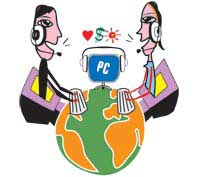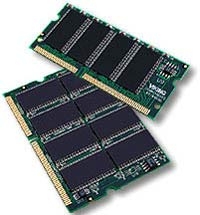“Let’s Skype tonight“, phrases like this are becoming increasingly familiar, indicating that the name of the company specializing in VoIP services has been turned into a verb and is widely popular among the Internet user community.
Skype is headquartered in Luxembourg with offices in London and Tallinn (the capital of Estonia). Recently, the online auction giant eBay acquired Skype for a price many consider exorbitant: $2.6 billion, plus an additional $1.5 billion in bonuses if certain targets are met by 2008.
 The Skype software allows users to connect online and make free calls with sound quality that rivals traditional telephones. The program was developed by the creators of the peer-to-peer file-sharing technology Kazaa (Niklas Zennström and Janus Friis), which transmits data directly between two end-user computers rather than through a server. However, Zennström stated: “Skype is completely different from Kazaa because it allows us to communicate directly to any telephone. This software has significantly cut into the revenue streams of major telecommunications companies, which are still exploiting outdated technology.”
The Skype software allows users to connect online and make free calls with sound quality that rivals traditional telephones. The program was developed by the creators of the peer-to-peer file-sharing technology Kazaa (Niklas Zennström and Janus Friis), which transmits data directly between two end-user computers rather than through a server. However, Zennström stated: “Skype is completely different from Kazaa because it allows us to communicate directly to any telephone. This software has significantly cut into the revenue streams of major telecommunications companies, which are still exploiting outdated technology.”
Two years after its launch, Skype had around 46 million registered users globally, more than any other VoIP service provider. The company offers free calls between two computers (PC-to-PC) but still charges for calls to regular landlines and mobile phones (SkypeOut).
| History of Skype 4/23/03: The domains Skype.com and Skype.net are registered. 8/29/03: The first Beta version is released. 6/15/04: The first trial version 0.98.0.28 supporting SkypeOut is launched. 7/27/04: Version 1.0 for Windows is released. 10/20/04: The service reaches 1 million simultaneous users for the first time. 3/10/05: SkypeIn Beta is launched. 3/11/05: 1 million SkypeOut users and a total of 29 million registered users. 4/15/05: Reaches 100 million downloads. 6/19/05: Records 10 billion minutes of calls. 5/09: SkypeOut is banned in China. 10/18/05: eBay acquires Skype for $2.6 billion. |
Unlike international long-distance calls from traditional phones, which are charged based on the distance between two countries, SkypeOut calculates fees based on a country’s relative development, the volume of incoming and outgoing calls, plus some additional costs. In this way, SkypeOut users pay the same rate for a call to Hanoi, regardless of whether they are using a computer in Vietnam’s capital or from the United States. The cost to call “first world” countries is currently $0.02 per minute, payable via credit card, check, or online services like PayPal and Moneybrookers. The deposit is either $12 or $24 and will automatically expire after 180 days of inactivity.
Meanwhile, with SkypeIn, users can register for a fixed phone number. If their friends do not use Skype and dial this number, they will still receive calls on Skype from anywhere. For example, if you register for a number in Chicago but are traveling in Paris, relatives in Chicago can still call you and only incur local calling charges. The beta released in March supports users registering up to 10 numbers from the UK, USA, France, Hong Kong, Denmark, Finland, Norway, Sweden, and Estonia at a price of $35 for 12 months or $12 for 3 months. Alongside this announcement on March 10, SkypeVoicemail was introduced, allowing users to leave voice messages if a Skype user is offline or on another call.
Additionally, Festoon is a supplementary feature of Skype that operates on computers running Microsoft operating systems with Internet Explorer version 5.0 or higher. With Festoon, customers can make group video calls with 2 to 200 participants and share applications, spreadsheets, photos, etc.
Skype can be downloaded for free directly from the company’s website and works on Windows 2000, Windows XP, Windows CE (Pocket PC), Mac OS X, and GNU/Linux.
In Vietnam, Skype is not widely used as it does not support the Vietnamese language and can only utilize PC-to-PC functionality.
According to research firm Gartner, by 2009, approximately one-third of Americans and Europeans will abandon traditional phone lines in favor of cost-effective wireless broadband phones. In the same year, 70% of conversations worldwide will be conducted over wireless connections. Skype will continue to be a widely favored service, even though Gartner predicts the emergence of more fixed-line phones integrated with VoIP.
VoIP is also seeking to penetrate the instant messaging (IM) system. In the upgrade of Yahoo! Messenger to version 7.0, the world’s largest online service focused mainly on Internet phone features, optimizing sound quality over broadband connections and dialing. “After email and IM, VoIP is opening a third chapter for popular applications on the global network,” asserted Frazier Miller, Director of Yahoo Messenger.
Similarly, the strategic move to introduce Google Talk by the leading search company is also centered on voice conversation, placing the company in direct competition with Skype.
Microsoft Chairman Bill Gates announced last week: “The VoIP era has exploded, and we want all of our applications on computers to connect beyond traditional boundaries.”
Quietly launched and little known, VoiceVNN from VASC has been offering free calls between two computers for over a year. Recently, the Vietnam New Generation Telecommunications Center (VNGT) also launched the Voice 777 service, providing free PC-to-PC calls. Unlike international phone cards like FoneVNN, SnetFone, or Net2Call, users only need two computers connected to high-speed Internet and a Voice 777 account to chat “across the ocean” without worrying about costs. Furthermore, unlike Skype, VNGT customers are allowed to use devices such as integrated Zoom modems or IP Phones to make calls as easily as traditional telephones without needing a PC.





















































